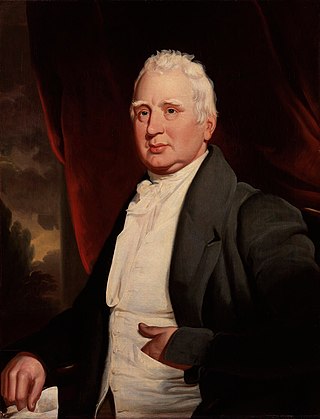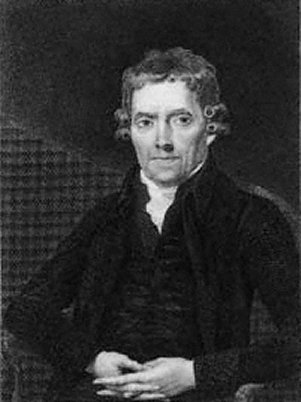Related Research Articles

The London Corresponding Society (LCS) was a federation of local reading and debating clubs that in the decade following the French Revolution agitated for the democratic reform of the British Parliament. In contrast to other reform associations of the period, it drew largely upon working men and was itself organised on a formal democratic basis.

William Cobbett was an English pamphleteer, journalist, politician, and farmer born in Farnham, Surrey. He was one of an agrarian faction seeking to reform Parliament, abolish "rotten boroughs", restrain foreign activity, and raise wages, with the goal of easing poverty among farm labourers and small land holders. Cobbett backed lower taxes, saving, reversing commons enclosures and returning to the gold standard. He opposed borough-mongers, sinecurists, bureaucratic "tax-eaters" and stockbrokers. His radicalism furthered the Reform Act 1832 and gained him one of two newly created seats in Parliament for the borough of Oldham. His polemics range from political reform to religion, including Catholic emancipation. His best known book is Rural Rides. He argued against Malthusianism, saying economic betterment could support global population growth.

James Montgomery was a Scottish-born hymn writer, poet and editor, who eventually settled in Sheffield. He was raised in the Moravian Church and theologically trained there, so that his writings often reflect concern for humanitarian causes, such as the abolition of slavery and the exploitation of child chimney sweeps.

Jeremiah Joyce (1763–1816) was an English Unitarian minister and writer. He achieved notoriety as one of the group of political activists arrested in May 1794.

Sir Francis Burdett, 5th Baronet was a British politician and Member of Parliament who gained notoriety as a proponent of universal male suffrage, equal electoral districts, vote by ballot, and annual parliaments. His commitment to reform resulted in legal proceedings and brief confinement to the Tower of London. In his later years he appeared reconciled to the very limited provisions of the 1832 Reform Act. He was the godfather of Francisco Burdett O'Connor, one of the famed Libertadores of the Spanish American wars of independence.

Richard Carlile was an important agitator for the establishment of universal suffrage and freedom of the press in the United Kingdom.
Joseph Gales was an American journalist, newspaper publisher and political figure. He was the father of the younger Joseph Gales.

Joseph Johnson was an influential 18th-century London bookseller and publisher. His publications covered a wide variety of genres and a broad spectrum of opinions on important issues. Johnson is best known for publishing the works of radical thinkers such as Mary Wollstonecraft, William Godwin, Thomas Malthus, Erasmus Darwin and Joel Barlow, feminist economist Priscilla Wakefield, as well as religious Dissenters such as Joseph Priestley, Anna Laetitia Barbauld, Gilbert Wakefield, and George Walker.
Events from the year 1792 in Great Britain.

The 1794 Treason Trials, arranged by the administration of William Pitt, were intended to cripple the British radical movement of the 1790s. Over thirty radicals were arrested; three were tried for high treason: Thomas Hardy, John Horne Tooke and John Thelwall. In a repudiation of the government's policies, they were acquitted by three separate juries in November 1794 to public rejoicing. The treason trials were an extension of the sedition trials of 1792 and 1793 against parliamentary reformers in both England and Scotland.
The Birmingham Journal was a weekly newspaper published in Birmingham, England, between 1825 and 1869.
Spencer Timothy Hall was an English writer and mesmerist.
John Holland was an English poet, newspaper editor and writer on mining, botany, geology, topography and metallurgy.
Winifred Marshall Gales was an American novelist and memoirist. Gales was born in 1761 in Newark-upon-Trent, England, the daughter of John Marshall. She wrote the first novel published by a resident in North Carolina.
James Everett (1784–1872) was an English Methodist and miscellaneous writer. He was a prominent figure behind the formation of the United Methodist Free Churches.
John Gale Jones (1769–1838) was an English radical orator. Until its suppression in 1798, he was active in the London Corresponding Society. He was several times imprisoned for provocative agitation against the government.
James Wroe (1788–1844), was the only editor of the radical reformist newspaper the Manchester Observer, the journalist who named the incident known as the Peterloo massacre, and the writer of pamphlets as a result that brought about the Reform Act 1832.
The Cambridge Intelligencer was an English weekly newspaper, appearing from 1793 to 1803, and edited by Benjamin Flower. The historian J. E. Cookson called it "the most vigorous and outspoken liberal periodical of its day".

Gellionnen Chapel is a Unitarian place of worship near Pontardawe, South Wales, United Kingdom. The chapel was first built in 1692 by Protestant dissenters, becoming Unitarian in the late 18th century. It is a member of the General Assembly of Unitarian and Free Christian Churches, the umbrella body for British Unitarians. Gellionnen Chapel is the oldest Dissenting chapel in the Swansea Valley, is one of the oldest surviving chapels in the region and is a Grade II* listed building.
John Edwards (1768–1808) was an English nonconformist minister and political radical. He is best known as the successor of Joseph Priestley at the New Meeting House, Birmingham.
References
- 1 2 3 James Montgomery, John Holland and James Everett, Memoirs of the Life and Writings of James Montgomery
- 1 2 3 Vickers, J. E. A Popular History of Sheffield.
- 1 2 3 4 "Gales, Joseph", Oxford Dictionary of National Biography
- 1 2 3 R. E. Leader, Reminiscences of Sheffield
- 1 2 3 4 "Montgomery, James", Oxford Dictionary of National Biography
- ↑ Marjorie Bloy, The Sheffield Corresponding Society
- ↑ Bibliographical Society, 2002-2003 Archived 20 November 2008 at the Wayback Machine
- ↑ J. H. Stainton, The Making of Sheffield, 1865–1914 (1924)